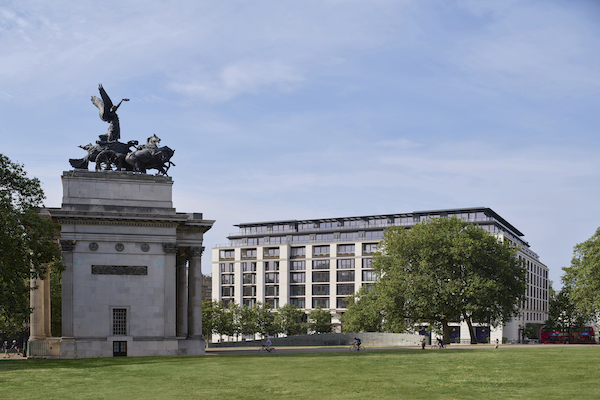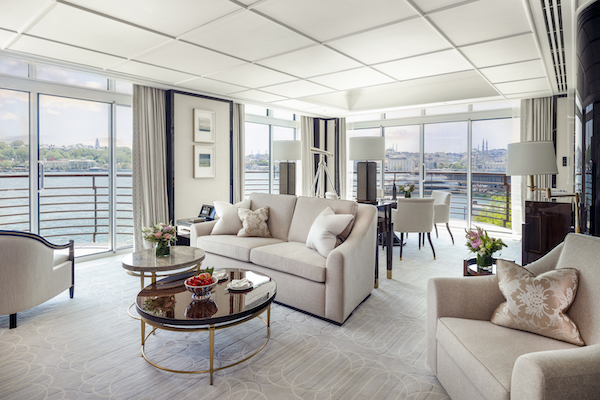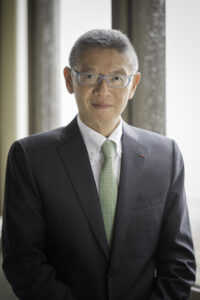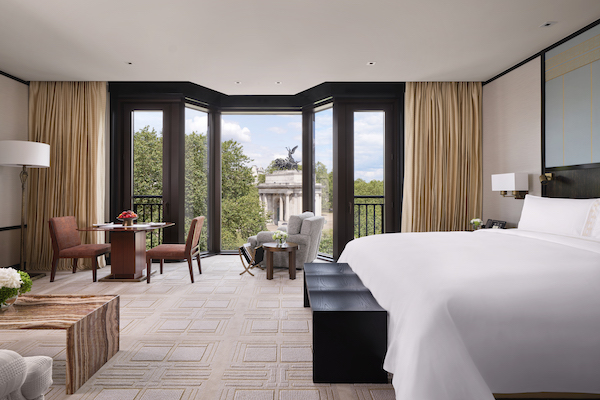The story of Peninsula Hotels in many ways is a tale of resolve and intuition.
It’s a saga of dynastic clans, two prominent Jewish families from Baghdad that in no small way helped build modern-day China. The Sassoons on one side, the Kadoories on the other, but Hatfield-McCoy this was not. Their competition was not of bloodshed or violence, but of commercial and financial dominance in and across Asia.
Consider Shanghai, the “Paris of the East,” where both families owned competing hotels at one point. The Sassoons had the Cathay Hotel (the present-day Fairmont Peace Hotel); the Kadoories had the Majestic. In this case, the Sassoons won out, with their hotel considered more modern, including boasting such amenities as indoor plumbing. It was the 1920s, after all.
The Kadoories sold the Majestic in 1930, but it was a hotel it previously started construction on in 1925 that would lay the foundation for a sturdy luxury hotel empire that has endured for close to 100 years.
The Peninsula Hong Kong, colloquially known as “the Pen,” officially opened in 1928 and operated without interruption until 1941 when the Japanese entered Hong Kong and occupied it until 1945. Even a war couldn’t put a stop to it.
Stretching back and up through today, Peninsula Hotels has been owned and operated by The Hongkong and Shanghai Hotels, Limited (HSH), which is 72% controlled by the Kadoorie family and its current-day paterfamilias, the 81-year- old non-executive chairman, Sir Michael Kadoorie.
The Kadoorie lineage is the thread that ties the Peninsula brand from its inception to its present day, with 11 hotels currently operating and another, The Peninsula London, opening in September.
If the Kadoorie name is the string that ties it all together, it’s Peter Borer, chief operating officer of The Hongkong and Shanghai Hotels, Limited, that has helped it not bunch up into a knot. Borer has been with HSH for more than four decades, the last 20 years as COO, helping run a company and delivering a sybaritic experience known the world over. It’s that kind of longevity and continuity that has allowed Peninsula to stay atop the luxury game.

HIGHLY DISTINGUISHED
Borer, quite literally, was destined to be a hotelier. He was born in a hotel in Switzerland, where his family was in the business.
A Peninsula stalwart, he understands his place within the company and its storied history as it comes set to open its 12th hotel. He refers deferentially to Sir Michael Kadoorie, calling him “the biggest differentiator” the company has. “His commitment to this company, to all his employees, his courage to invest in projects like The Peninsula London—it is our greatest distinction,” Borer said.
The 190-room Peninsula London is a project worth the wait. As Borer told it, they had been looking for a suitable location in the city for 30 years. “We are very picky,” he said.

It’s a pervasive sentiment at HSH— one that starts at the top. “We are very particular and demanding about our requirements for a Peninsula hotel,” said Clement Kwok, managing director and CEO of The Hongkong and Shanghai Hotels, Limited. “An immense amount of effort and time goes into finding the perfect property.”
Beyond London, consider The Peninsula Istanbul, which opened in February, along the Bosphorus waterfront in the historic district of Karaköy. “It took over 10 years from finding the project to final delivery,” Kwok said.
Patience paid off for both properties. On the location of the London property once sat a rather nondescript, 1960s-style office building that was razed to make way for the hotel, which is alongside Hyde Park Corner and Wellington Arch, in the tony Belgravia neighborhood. It is the first UK hotel for designer and leather enthusiast Peter Marino, who did the interiors. He was complemented by a slew of top British artisans, including Jenny Packham (employee uniforms), Claude Bosi (F&B), Timothy Han (scent curation) and more than 40 artists from The Royal Drawing School.
The property sits on a 150-year lease and as Borer told it, it’s been built to be around for 150 years. “It’s not just the quality of
the carpets; it’s the infrastructure of the building,” Borer said, citing things like the “finest” piping, for instance, the “fastest” elevators and an air-conditioning system that emits the “cleanest” air.
The development of The Peninsula London, from the bricks and mortar to the ensuing experience, like Peninsula’s preceding hotels, is shaped and delivered by Peninsula and HSH. There are no intermediaries or partners to offer an opinion, which is decidedly difficult now in the age of asset–light lodging companies that trade on a name.
“The fact that we’re owners and operators allows us to stay true to our brand, because if you have to deal with many different owners, then, of course, they have different financial expectations,” Borer said. “And they may force you to make amends to what your brand image wants to be.”

OUR WAY
Not so for Peninsula Hotels, which owns the bulk of its hotels, the exception being The Peninsula Beverly Hills and The Peninsula Paris, each of which HSH owns 20%. Beyond hotels, HSH has interests in multifamily accommodations, restaurants, office buildings and Peak Tower in Hong Kong, one of the biggest tourist attractions in the city.
The Kadoorie philosophy, Borer relayed, is to not stand on just one leg. The Peninsula Shanghai was the first Peninsula hotel to offer residences (there are 39 units), while The Peninsula London boasts 26 units, with almost all already sold.
The Peninsula portfolio stretches from Chicago to Tokyo, with points in between and afar. As much as London is meant to be a city hotel, Borer defined The Peninsula Istanbul as a resort.
He referred to the Istanbul project as “funny,” only because the three existing buildings were, he said, “quirky,” in a Bauhaus style of way. “Very funky,” he said. “When I first saw it, I’m like, ‘Oh my god, what am I doing?’”
It worked out well in the end, and a fourth building was added to house a ballroom. The hotel has some 250 meters of clear frontage on the Bosphorus and Peninsula added a garden containing more than
300 trees. “It’s a very lush and romantic environment,” Borer said.

LUXURY LESSONS
Peninsula Hotels and other luxury properties of its ilk might seem like they operate in the ether, but even they run into challenges. The pandemic touched everyone and it hit exponentially hard on luxury hotels. It forced Peninsula to close some of its hotels in full, though some, like its flagship Hong Kong property, remained open, but its demand mix changed almost overnight into one catering to only locals, which transmogrified into staycations. Borer said The Peninsula Hong Kong was able to get to around 40% occupancy during the throes of the pandemic, but did drop rates.
This theme applied through the portfolio, like at The Peninsula Tokyo, which was forced to close on two separate occasions and then began to cater mainly to a Japanese clientele.
“When the pandemic ended, we saw massive demand from international travelers. And what we discovered is the need for comfort and safe haven,” Borer said. He cited the Middle East as one feeder market where demand patterns have shifted. In the summer, to beat the heat, Middle Eastern travelers typically take flight to destinations such as the U.K., France or the U.S.

“Now,” as Borer pointed out, “they’ve changed the school year and have two breaks, so we’re actually seeing a very nice increase of that region into Asia.”
The pandemic, however, did not give Peninsula cover to cut back on the services and amenities the brand is known for. In fact, as Borer pointed out, those services and amenities were increased. “Now, with the increase in demand, it’s allowed us to raise rates and provide a true five-star experience,” he said.
More emphatically, Borer isn’t coy about what it means to be a Peninsula hotel and its place within the competitive landscape. “We are a small company. We can’t afford to become mediocre and we don’t have a right to exist as a mediocre company,” he said.
Like all segments, the luxury market is not immune to the labor crunch. Moreover, frontline employees in a luxury environment have a set of service points and mannerisms to ply that are distinct from other types of hotels. In Peninsula’s Tokyo property, for example, most of the room attendants—and this isn’t dissimilar to any hotel in the city—are housewives who are employed not by Peninsula, but by outside agencies. They work a few hours per day or per week; whatever suits their schedules. Post COVID, it’s been difficult to get them to return, Borer said.
The Peninsula London has a different problem: too many applicants to choose from. According to Borer, there were 31,000 applications for the 600 positions to fill. Blame marketing: The hotel advertised jobs on the London Tube, with advertisements and a WhatsApp number to message.
PENNING THE FUTURE
Two luxury hotels opening in the span of eight months—especially for an outfit like the punctilious Peninsula Hotels—is immense. It doesn’t mean that Peninsula isn’t out scouting for the next. It’s a brand that started east, spread west and now is filling in the gaps. “What we are trying to do is to go overseas and enter into the most important cities in the world, and
we seek not just a prime location, but the most exceptional sites in that city,” Kwok said. “We are always looking into the long term. You can’t invest in projects like these with a short-term horizon, so we make investments where we are assessing a return over 20, 30 or even 50 years. You need to have the staying power, the willpower and the ability to maintain all of this.”
Peninsula has been in New York since the early 1990s, occupying a Beaux-Arts building that dates back to 1905 when
it opened as the Gotham Hotel. Today, it is positioned right across the street on Fifth Avenue from another storied New York hotel, The St. Regis New York. HSH acquired the building’s lease in 1989, when it was trading as the Hotel Maxim’s de Paris. The hotel was renovated in 1998 and is now embarking on what Borer called a “big” renovation.
Counting London, there are 12 hotels today. It could have been 13, but a project in Yangon, the largest city in Myanmar, had to be shelved in 2021 due to the political strife there. Reports say that HSH had to write off nearly $90 million of the $130-million project, which was around 70% complete when the plug was pulled. It could get back on track in the future, Borer said. “We hope if things improve that, one day, this project might be revitalized,” he said.

Nothing else is currently or formally in the pipeline and Borer said attention now will be on improving existing assets, especially with technology.
What about another brand altogether? Don’t bet on it, but it’s not a foreign concept: Some luxury hotel companies, such as Langham Hospitality Group, which, like Peninsula, is headquartered in Hong Kong, have launched brands that cater less to
the traditional luxury traveler and more to a younger cohort in search of a different experience.
In 2022, Langham launched Ying’nFlo, an upper-midscale brand, geared to millennials and GenZers. Since 2014, another Hong Kong-based luxury hospitality company, Shangri-La International Hotel Management Ltd., has operated the lifestyle-centric Hotel Jen brand, which was subsequent to Kerry Hotels, positioned as “relaxed” luxury.
Peninsula dabbled in this informally with a hotel it had in Hong Kong. It didn’t stick and don’t expect it to return while Borer is around. “I’m an absolute, total and firm believer in brand purity,” he said. Borer is an ardent admirer of brands like Chanel, which has never strayed from its core being, never deviated from Coco Chanel’s intent. He also lists Ferrari as inspiration, having stuck to building the absolute best in cars.
Borer wants the same superior singularity for Peninsula. And like Chanel or Ferrari, The Peninsula name stands on its own, just the way Borer wants it. “We don’t put hotels or resorts or whatever with it—it’s just The Peninsula,” he said. “That was always my dream.”
It’s now a truth.
